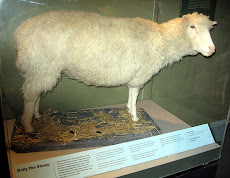A House panel has given its approval to two measures that would prohibit cloning, the sale of human embryos and efforts to create human-animal hybrids.
The provision in S1307 that outlaws creation of hybrid humans drew skeptical questions from Rep. Ed Ableser, a Tempe Democrat.
“Is this bill trying to stop future Islands of Dr. Moreau?” he asked. “Is this part of a broader scare? Is this a paranoia of monstrosities, of animals and humans cloned together?”
Nikolas Nikas, an attorney and founder of the Bioethics Defense Fund, said the matter is less science fiction than one might imagine. The British Parliament recently gave approval for scientists to merge the DNA of human and animal embryos. The result hasn’t been a true hybrid - half human, half animal - he said, but a “cybrid,” where only a minute fraction of the DNA is that of an animal.
But that doesn’t erase the ethical questions such experimentation raises, Nikas said.
“There are profound ethical questions about how much … animal does a human embryo have to be before you wonder if it’s still a human,” he said. “Anyone who says it can’t be done is foolish.”
However, critics said the bill could stifle medical research in Arizona. Dr. Kimball Pomeroy, an embryologist, told the House Health and Human Services Committee that tests routinely performed by embryologists would be criminalized by the bill.
One such test to determine infertility problems uses a hamster egg to determine if a man’s sperm is able to penetrate the egg. Pomeroy said that would be outlawed under the bill.
And Pomeroy said that, while the United Kingdom’s research into cybrids sounds unusual, the method is aimed at developing ways to cultivate human stem cells without creating human embryos.
“What this (bill) really is, is an anti-stem cell (research) bill,” he said. “This sort of bill prohibits a lot of future research and it paints us as anti-science.”
But Nancy Barto, a Phoenix Republican and the bill’s sponsor, said there are some research techniques that conservative lawmakers and scientists are bound to disagree philosophically on.
“What we’re trying to do is preserve life and not sacrifice it on the altar of research to save another life,” she said.
The bill passed 5-2, with Ableser and Tucson Democrat Phil Lopes voting against it. After a check for constitutionality, it will be ready for floor debate and voting.
The committee also approved SCR1044, which would ask voters in November to amend the state’s constitution to ban all forms of human cloning. The measure was approved 5-1, with Ableser voting against it.
Monday, May 3, 2010
Subscribe to:
Post Comments (Atom)


No comments:
Post a Comment